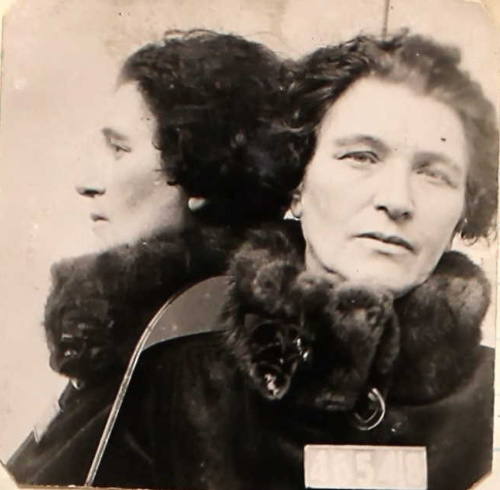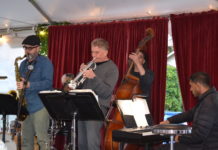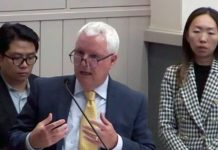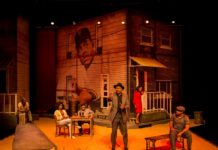
As the City Council prepares to consider asking voters whether to change the City Treasurer’s position to an appointive instead of elective office, a check on the history of the South Pasadena Treasurer’s status offers uncertain guidance on the merits and politics of the proposal. The issue has been at the center of at least two political controversies and one scandal.
The Record
Over the past 112 years, South Pasadena has had 10 City Treasurers.
Five—Cyrus Mungo, Charles Cramer, Don H. Dollison, Edward A. Ristow and Gary Pia, were all initially elected and in most cases re-elected to multiple terms. The other five—Edith Lowry, Harvey Huntzinger, Earl Beasley, Ida Willis and Victor Alan Robinette, were all initially appointed by the City Council and went on to be elected to multiple terms.
First Struggle
Texan William H. Lowry was a politically connected cesspool excavator who arrived in South Pasadena about 1900. In addition to working as a South Pasadena poll inspector and judge, he worked for LA County Commissioner R. W. Pridham, who’d also been Mayor of South Pasadena. Lowry served as City Tax Collector and City Building and Plumbing inspector. But in 1916 he died suddenly at age 47, leaving his 35-year-old wife Edith and their two young children.
In 1920, incumbent Treasurer Charles Cramer resigned to take a better-paying job. Edith Harriet Lowry was among three who offered to take over. Lowry, who’d made several appearances on the local society pages, had adopted her late husband’s avocation of serving as a poll worker.
Her bid for the appointment was supported by W. D. Newerf, owner of the Newerf Rubber Company and other businessmen. Mrs. Otto B. Manchester, President of the Women’s Improvement Association, spoke in favor of Lowry: “I am satisfied with her fitness educationally and otherwise.” A group of other prominent women also spoke for Lowry. City Council Member John P. Whitmore publicly vouched for her integrity.
On July 26, 1920, the City Council unanimously voted to appoint Lowry, and she was subsequently re-elected four times. At the time, Treasurers served two-year terms.
But in November of 1928, Lowry was found to have spent those years embezzling increasingly large sums from the street improvement redemption fund paid to the city by at least 74 property owners, and other funds totaling nearly $15,000–six times her annual salary as Treasurer.
Lowry was indicated by a Los Angeles grand jury, ultimately plead guilty and was sentenced to one-to-ten years. She was promptly escorted to San Quentin.

The public was initially told Lowry had resigned due to illness. After the indictment came out several weeks later, officials discussed it publicly. The Council had experienced “the utmost cooperation with every other department” of the city, Mayor Burton Garlinghouse said. “We desired to have such relationship with her department. It was refused on the ground that she was elected by the people and that she was responsible only to them for the conduct of her office.”
Only 18 months later Lowry was released, having argued she was only trying to support her children after the death of her husband and those of her mother and sister-in-law that quickly followed.
The parole board had clemency recommendations from both the judge who sentenced her and LA district attorney who prosecuted her. Lowry’s South Pasadena attorney, Edward A. Stuart, said “numerous people in this vicinity have also written letters to the board urging parole.” Nor did the city protest.
“It was particularly unfortunate that because of her position as a public official, probation was not possible, as I do not believe that there was any disposition on the part of anyone connected with the case to have her imprisoned,” Stuart said.
Nonetheless the parole decision was not welcomed elsewhere. “The effect of such mitigation is to encourage weak kneed officials to take a chance and help themselves to public funds,” the Chico Enterprise editorialized.
Second Struggle
The Lowry affair came at a volatile time. South Pasadena and other California cities were in the throes of a wave of elections of “freeholders”—large citizen panels who drew up proposed city charters for submission to voters of general law cities, with the aim of streamlining municipal services. Freeholders advocated for running cities “like corporations,” using a charter that “centralizes authority in the hands of the City Council.”
The Freeholders wanted City Council members to be elected at-large but debated whether other city officials like Clerks and Treasurers should be elected or appointed. Most of the South Pasadena Freeholders—the 12 nominated by the City Council–advocated for appointing the Treasurer and Clerk, while the three nominated by citizens preferred at-large elections for those offices and district elections for Council seats.
The chair of the 15-member South Pasadena Freeholder Board was former Mayor Ernest V. Sutton, who supported appointments. On Jan. 2, 1929, he told the Women’s Club of South Pasadena “the wisdom of this change is emphasized in an unfortunate way, in the matter of the City Treasurer. A condition such as this could not have arisen, had the Treasurer been appointed, and subject to the supervision of the Finance Committee of the Council.” He neglected to mention Lowry had originally been appointed.
“It was apparent for a very long time that something was wrong in the conduct of the office, but nobody had the power to investigate until things had gone to such a length that they fell of their own weight” Sutton explained.
C.C. McKee, a building contractor who was one of the three citizen Freeholders, disputed Sutton’s claim, arguing the flaw was a state law preventing audits. “I am opposed to appointing the City Clerk and City Treasurer,” he wrote in a letter to the editor. “It has always been considered a prerogative of the people to elect” those officers.
Sutton even brought in Harvard professor William Bennett Munro, author of a book on municipal government who advised on the drafting of city charters. During a speech attended by South Pasadena Mayor Burton Garlinghouse and other city officials and Freeholders, Munro complained “most city charters seem to be drafted with the idea that all public officials are crooks.”
George G. Osgood was a citizen Freeholder who initially supported the charter but turned against it after the Council-nominated Freeholders, led by Sutton, switched out the citizen members’ provision to elect Council members by district for the Council-appoint Freeholders’ plank for at-large Council elections. Osgood also believed the Clerk and Treasurer should be elected. He also opposed the charter because its recall provision required 30 percent of the electorate to place a recall on the ballot.
Sutton countered the high percentage was intended “to prevent malcontents disgruntled with the Council over their chickens or dogs” from invoking it.
On January 15, 1929, only 1,390 South Pasadena voters—17 percent of the electorate–turned out for the election. The charter lost by a landslide: 1,071 to 319.
Two weeks later, Lowry was sentenced and taken to San Quentin.
She died in Burbank in 1973.
Third Struggle
As part of a cost cutting move nearly 50 years ago, then City Manager Ted Coleman suggested eliminating the elective offices of both the City Treasurer and the City Clerk. To do so would have required a vote of the people.
On Aug. 7, 1974, City Treasurer Ed Ristow and City Clerk Marjorie Merritt released statements opposing the move.
At the time Ristow, a CPA and attorney who served 23 years as City Treasurer and still lives in South Pasadena, said “the quality of government is improved when the people have the direct say over who will serve them and the unfettered right to vote out those who have not served well.
“The Clerk and Treasurer have specific functions to perform under the law and are directly responsible to the voters. An elective official in any post is more responsive to the public than an appointed official.” He said a city’s elected and appointed officials “complement each other and work together as a team, at the same time functioning as a check and balance on their respective powers.
“In the absence of a compelling showing of savings or benefit to the taxpayers, control over the city’s purse strings should remain in the hands of a Treasurer who must satisfy the electorate as to his honesty and integrity and not in the hands of one who is beholden to other city officials.”
Ristow noted that voters in three California cities—Monterey Park, Ontario and Millbrae–had all recently rejected similar proposals. To this day, Monterey Park and Ontario still have elected Treasurers, though Millbrae took the plunge to appointing the position in 2009.
Ristow proposed consolidating the city’s financial administration, giving up his status as a department head and transferring to a finance director the duties performed under the ordinance in place at the time. The Treasurer and Clerk “would retain their elected status and continue to perform their elected duties,” he wrote.
The city ultimately dropped the plan.




















.png)










This article was done very well. A pleasure to read and informative. Thank you.